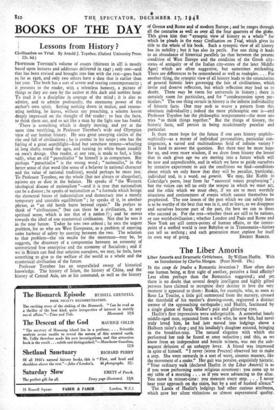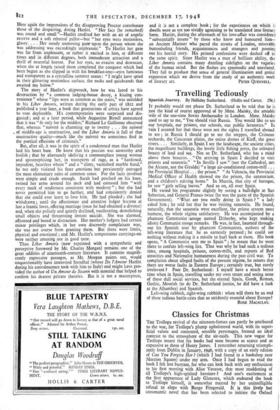The Liber Amoris
Is the coup de foudre a Romantic invention ? How often does one human being, at first sight of another, perceive a fatal affinity? Less often perhaps than the Romantics suggested ; and yet there is no doubt that several deeply intelligent and highly gifted persons have claimed to recognise their destiny in love the very moment it appeared to them: Ruskin, for example, who, as soon as Rose La Touche, a little girl summoned from the nursery, crossed the threshold of his mother's drawing-room' registered a distinct tremor of the approaching earthquake ; and Hazlitt, fascinated by a single glance of Sarah Walker's pale and glittering eyes.
Hazlites first impressions were unforgettable. A somewhat lonely middle-aged man, separated from a wife who, he now felt, had never truly loved him, he had just moved into lodgings above a Holborn tailor's shop ; and his landlady's daughter entered, bringing in the breakfast-tray. The natural elegance with which she performed her task he found at once seductive ; and this as we know from an independent and hostile witness, was not the sub- sequent delusion of an unhappy lover. A friend was impressed in spite of himself. "I never (wrote Proctor) observed her to make a step. She went onwards in a sort of wavy, sinuous manner, like the movement of a snake." Her gait was pensive, exquisitely hieratic. "Your ordinary walk (declared Hazlitt in the Liber Antoris) is as if you were performing some religious ceremony: you come up to my table of a morning . . . as if you were advancing to the altar. You move in minuet-time: you measure every step. . . . I never hear your approach on the stairs, but by a sort of hushed silence."
The Lamia of Hazlitt's lodgings had other curious attributes, which gave her silent visitations an almost supernatural quality. Here again the impressions of the disapproving Proctor corroborate those of the despairing, doting Hazlitt. "Her face (he remarked) was round and small "—Hazlitt credited her with an air of angelic reserve and a soft ethereal pallor—but "her eyes were motionless, glassy. . . . Her steady unmoving tazrupon the person whom she was addressing was exceedingly unpleasant." To Hazlitt her gaze was far from unpleasant, or rather it excited in him, at different times and in different degrees, both immoderate attraction and a thrill of resentful horror. For her eyes, so evasive and downcast,
when she at length raised them completed the Conquest which had been begun as she slipped in with his breakfast-tray—eyes luminous and transparent as a crystalline summer ocean: "I might have spied in their glittering motionless surface, the rocks and quicksands that awaited me below."
The story of Hazlitt's shipwreck, how he was lured to his destruction by "a common lodging-house decoy, a kissing con- venience" whose "lips were as common as the stairs," was unfolded in his Liber Anions, written during the early part of 1822 and published a year later' a book that generations of critics have agreed to vote deplorable. His contemporaries were surprised and dis- gusted; and at a later period, while Augustine Birrell announced that it was "fit only for the midden," Richard Le Gallienne observed that, whereas "naïveté is charming up to twenty . . . the naiveté. .0, middle-age is unattractive, and the Liber Amor-is is full of that unattractive quality—much like the naiveté we sometimes find in the poetical effusions of criminals."
But, after all, it was in the spirit of a condemned man that Hazlitt laid his heart bane. He knew that his passion was unworthy and foolish ; that by alternately idolising a commonplace young woman and apostrophising her, in transports - of rage, as a "hardened, impudent, heartless whore" and a "slimy, varnished marble fiend," he not only violated his finer emotions but persistently outraged the most elementary rules of common sense. For the facts involved were simple and crude enough. Sarah had perched on his knee, twined her arms around his neck and had caressed him "with every mark of tenderness consistent with modesty " ; but she had never permitted him to go further, and had consistently denied that she could ever learn to love him. He had pleaded ; she had withdrawn ; until the affectionate and attentive lodger became at last a frantic lover, offering marriage (once he had obtained a divorce) and, when she politely and quietly declined, vociferating, demolishing small objects and threatening instant suicide. She was alarmed, affronted and bored to distraction. Her mother's lodgers had certain minor privileges which, in her own discreetly complaisant way, she was not averse from granting them. But there were limits, physical and emotional ; and Mr. Hazlitt's tempestuous carryings-on were neither amusing nor in good taste.
Thus Liber Amoris (now reprinted with a sympathetic and ' perceptive foreword by Mr. Charles Morgan) remains one of the great oddities of nineteenth-century literature. It contains magnifi- cently expressive passages, as Mr. Morgan points opt, would unquestionably have interested Stendhal (whose De ?Amour Hazlitt during his convalescence took with him to Italy) and might have pro- vided the author of Un Amour de Swann with material that helped to confirm his dearest private theories. But it is not a masterpiece, and it is not a complete book ; for the experiences on which it dwells were as yet too vividly agonising to be translated into literary form. Hazlitt, during the aftermath of his love-affair was considered "substantially insane" by those who knew and honoured him— an Ancient Mariner who paced the streets of London, miserably buttonholing friends, acquaintances and strangers and pouring out his horrid story. His printed confessions were dashed off in the same spirit. Since Hazlitt was a man of brilliant ability, the Liber Amoris contains many dazzling sidelights on the vagaries of the human mind. But the flashes are spasmodic and unrelated. They fail to produce that sense of general illumination and genial expansion which we derive from the study of an authentic work



































 Previous page
Previous page